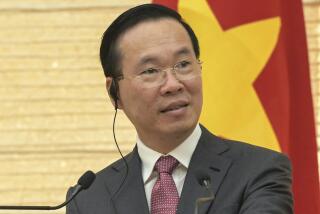Communist Party Chief of Beijing Quits in Scandal
- Share via
BEIJING — The powerful Communist Party chief of Beijing quit Thursday amid a growing scandal and was replaced by the party’s top anti-corruption official.
The resignation of Chen Xitong, which followed the suicide of a top aide linked to the corruption scandal, was the most dramatic development yet in the battle to replace Deng Xiaoping, China’s ailing senior leader.
Chen was replaced by Wei Jianxing, 64, secretary of the Central Discipline Inspection Commission, which is responsible for investigating corruption in the Communist Party.
Thursday’s power shuffle was notable because of the political strength and ties of Wei and Chen, a Politburo member and former Beijing mayor infamous for declaring martial law during the 1989 demonstrations in Tian An Men Square.
Chen was linked to Deng but was believed to be at odds with a front-runner to replace the paramount leader. Wei was not only a protegee of Hu Yaobang, the late party reformer whose death sparked the 1989 protests, but also is an ally of yet another possible Deng successor.
Chen’s ouster was accomplished via an important new issue in economically booming China: an anti-corruption drive. Further, his recent political conflicts have renewed attention on the effect very different regional power bases--Beijing versus Shanghai--will play in the Deng succession.
His fall also suggested that the Chinese soon may re-evaluate the hard-line position China’s leaders took against the Tian An Men pro-democracy protests.
News of Chen’s resignation swept Beijing late Thursday afternoon when party cadres were called suddenly into meetings to be told the news.
The Central People’s Radio today confirmed the Beijing party chief’s ouster, saying Chen, 64, bore “the inescapable responsibility” for the suicide of his subordinate, Deputy Mayor Wang Baosen, on April 4. The radio network, which reaches all corners of China, confirmed Wei’s appointment.
The resignation was front-page news in the Beijing Daily, which ran a large picture of Wei and published a front-page editorial, which said: “The case of Wang Baosen proves that the anti-corruption struggle has hit deep. It shows that the bourgeois corruption mentality seriously invaded the body of the party and of the government.”
Besides Beijing’s deputy mayor, several other senior municipal officials, known locally as “the Gang of Secretaries,” have been implicated in the corruption case, involving a massive development project in central Beijing by Hong Kong investor Li Ka-shing, one of the world’s richest men.
*
Thursday’s resignation came amid another wave of rumors that Deng, 90, is dead or dying. After the rumors caused stock markets in Hong Kong and Taiwan to dive, a government spokesman said in Beijing that he was instructed to announce that Deng’s health was “generally good.”
“For an old man in his 90s,” said Foreign Ministry spokesman Chen Jian, “Comrade Deng Xiaoping is in generally good health.”
At first glance, the long-rumored resignation of Chen, a tennis devotee who was one of the main sponsors behind Beijing’s unsuccessful bid to host the 2000 Summer Olympic Games, will be viewed as a sign of strength for national party leader and President Jiang Zemin. Chen and Jiang were rumored to be at odds.
According to one story, Chen once wrote a letter to Deng complaining about Jiang. Their rivalry also pitted Beijing, where Chen built his powerful political base, against Shanghai, where Jiang first came to prominence.
But the succession picture is more complicated, because the new Beijing party chief, Wei--a Soviet-trained former mayor of Harbin, in Heilongjiang province--is also said to be close to Qiao Shi, chairman of the National People’s Congress and another leader in the running to replace Deng.
In recent months, Wei has played an increasingly high-profile role in Chinese politics, delivering several well-publicized speeches condemning corruption and abuse of position.
In January, Wei gave a speech decrying “lawlessness and indiscipline in leading party and government bodies.” He has also spoken out against party officials who host big banquets or maintain luxurious lifestyles.
On another level, the political reshuffling has important implications for the political reassessment of the bloody 1989 army crackdown on pro-democracy demonstrators in Beijing.
As the man who declared martial law, Chen was considered a villain of the crackdown in which hundreds, perhaps thousands, of people were killed by Chinese soldiers. Many believed that a national review of the 1989 events will occur after Deng dies.
The battle to replace Deng at the pinnacle of Chinese power has been waged in the context of a national anti-corruption drive, in which even the highest officials appear to be fair game.
More to Read
Sign up for Essential California
The most important California stories and recommendations in your inbox every morning.
You may occasionally receive promotional content from the Los Angeles Times.













